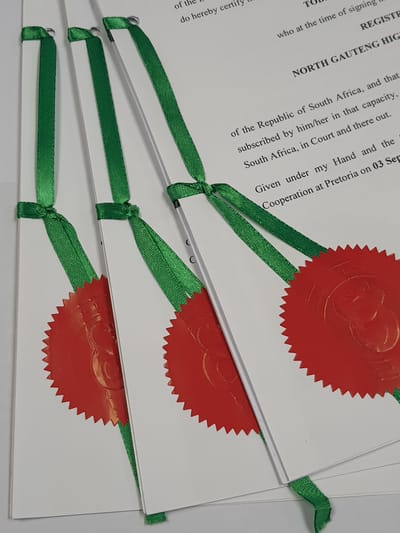DOCUMENT aUTHENTICATION (LEGALISATION) SERVICE SOUTH-AFRICA
Documents destined for Non-Hague Apostille Convention Subscribing Countries. Rather let us handle your document authentication

Phone us for a free consultation at 0870010733 or submit questions you might have or obtain a no obligation quotation.
We're here to help you!
We are staffed by experts in the South-African authentication and legalisation process. When you contact us for your free consultation we’ll review the specifics of your situation, go over your options with you, and answer any questions you have.
We assist you in preparing your documents for processing, you send or drop of your documents to our Pretoria office, and then we manage all aspects of the authentication and legalisation process for you.
Getting started is easy – phone us at 0870010733 or fill out our quick Get Started form or Online Quotation Form.
How can I find out whether I need to Apostille, authenticate or Embassy At my documents?
Find out what the appropriate process is to legalise your documents.
To find out whether you need to authenticate and legalize your documents, you should determine the staus of the recipient country abroad.
If you have South-African documents that will be used in another country which country is not an signatory to the Hague Apostille Convention, they will likely need to be authenticated and sometimes be embassy attested, also known as document legalisation or authentication.
The reason for the process is to verify the signatures on your documents. By having the documents authenticated and legalised, the recipient abroad can rest assured that your documents have been properly processed. You can also contact our specialist staff to discuss your situation. We would love to hear from you!
Get Started
Getting started is easy. Phone us at 0870010733 or fill out this quick online form and we’ll get back to you right away.
Get no obligation Apostille Quotation - How much will it cost?
Most customers order and quote online. Submit online form and we will get right back to you. If you are not sure how to complete the order form or need any advice on additional service do not hesitate to message us for professional free advice. Tel: 0870010733.
What is document legalisation / authentication
Legalisation describes the procedures whereby the signature/seal/stamp on a public document is certified as authentic by a series of public officials along a “chain” to a point where the ultimate authentication is readily recognised by an official of the State of destination and can be given legal effect there. As a practical matter, Embassies and Consulates of the State of destination located in (or accredited to) the State of origin is ideally situated to facilitate this process. However, Embassies and Consulates do not maintain samples of the signatures/seals/stamps of every authority or public official in the State of origin, so an intermediate authentication between the authority or public official that executed the public document in that State and the Embassy or Consulate is often required. In most cases, this involves an authentication by the Ministry of Foreign Affairs of the State of origin. However, depending on the law of the State of execution, a series of authentications may be required before the document can be presented to the Embassy or Consulate for authentication. Then, depending on the law of the State of destination, the seal/stamp of the Embassy or Consulate may be recognised directly by the official in that State or may need to be presented to the Ministry of Foreign Affairs of that State for final authentication.
Documents
Click below for a list of the more common documents we process, or contact us to discuss your particular document.
Pricing
How long does it take to authenticate and legalise a document?
If you try to handle the process yourself by, the process will consume significant time and effort. Numerous attendances and at various entities are usually required to authenticate your documents.
DIRCO currently takes a minimum of 20 business days to authenticate submitted documents.. Following the authentication, typical processing times at most embassies and consulates range from 2 to 5 business days. Note that due to COVID, the authentication and legalisation process is currently subject to frequent delays.
We can expedite the authentication process because of our expertise. We will also help you prepare the documents and ensure they meet the criteria of the process. Document Legalisation Specialists are standing by if you have any questions or concerns you need to discuss. Contact us for your free consultation. or call us at 087 0010 733.
OUR TEAM IS HERE TO ANSWER YOUR QUESTIONS
CONTACT US TODAY AND WE WILL REPLY WITHIN 24 HOURS


